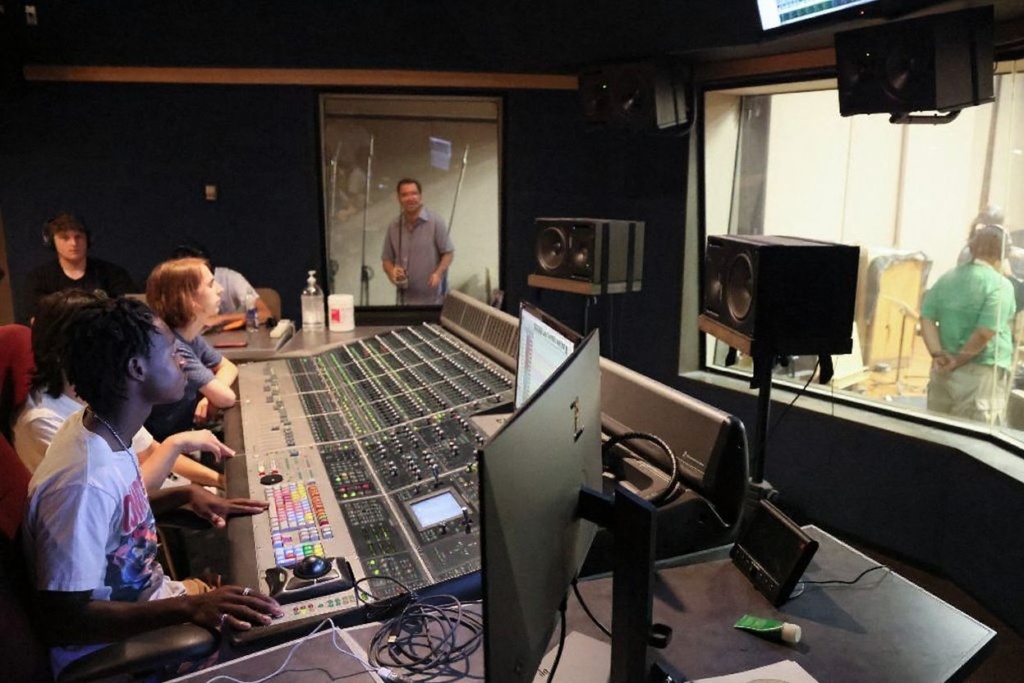
It’s easy to romanticise dropping out of performing arts and music degrees and skip right to your career, especially when you hear stories of celebrities like Timothée Chalamet and Lady Gaga who took that route.
However, the reality is that many artists have found success with formal education.
Jesse Tyler Ferguson, who rose to fame in “Modern Family,” holds a Bachelor of Fine Arts from The American Musical and Dramatic Academy (AMDA), while Mike Portnoy, the former drummer of Dream Theater, graduated from Berklee College of Music.
Even K-pop idols like Taemin of SHINee pursued a Master’s in Film and Musical Studies at Myongji University — and it’s no surprise why.
A music degree provides all-encompassing training that can shape your musical career.
From mastering music theory to developing performance skills, ear training, and conducting, music degrees equip you with the tools necessary to succeed in the industry. Specialised tracks in voice or instrumental performance open up even more career pathways too.
Take Kim Moon Jung, a South Korean musical director and professor who has built a successful career after earning music degrees in composition, digital music, and performing arts.
Jung has since worked on over 50 musicals and received the Prime Minister’s Commendation at the 12th Korean Popular Culture and Arts Awards in 2021.
Her story proves that a music degree is the foundation that can help turn your passion into a rewarding career.
 In music, success isn’t immediate, and most artists need a side job to make it work.
In music, success isn’t immediate, and most artists need a side job to make it work.
The harsh realities of breaking into the music industry
Breaking into the music scene is a dream shared by aspiring musicians, but the reality is far from glamorous.
In 2023 alone, 1.3 million artists were added to Chartmetric, a platform that tracks global music streaming data.
Of these, 87.6% fell into the Undiscovered category, while just 12.3% reached the Developing stage (up-and-coming musicians). And only a mere 0.05% moved on to the Mid-Level stage (artists with growing influence) or higher.
For most, stagnation in their current category is a harsh reality, with limited opportunities to climb the ranks.
This struggle often forces aspiring musicians to take on multiple jobs to support themselves during their pursuit of success.
Vance Kotrla from the band Sci-Fi Romance, for example, had to work two jobs when he was younger.
“I had to be at a breakfast restaurant at 5:30 a.m. and worked night shifts making copies for a legal services company,” he said.
However, managing two jobs while trying to find success in film was too taxing, so he moved to Los Angeles to write movies.
This helped him kickstart his career and become the Emmy and Hugo Award winner he is today.
Unfortunately, not many people share the same success as Kotrla. According to journalist Jordan Schneider, 90% of aspiring artists don’t make it in music production.
And for them, the weight of their day-to-day challenges becomes too much, leading them to abandon their dreams and shift to entirely different career paths. Take this Reddit user, for example — they became an electronics technician because writing music wasn’t enough to keep them “fed and happy.”
The ripple effects of this harsh environment extend beyond artists to related industries as well.
The US Bureau of Labor Statistics projects that employment of news analysts, reporters, and journalists will decline 3% from 2023 to 2033, a trend already visible as print music magazines like Future Music shut down.
Music journalists now need to adapt, shifting their work to digital platforms where opportunities are more promising.
Still, this doesn’t mean you should give up your dreams of studying and working in music. Some of the careers these degrees offer can bring in an annual salary of US$246,250 — so don’t give up and check out the best music degrees to sign up for to secure your future.
9 music degrees for a future in music
Note: The fees for the music degrees below have been converted to US dollars.
 Performing on Broadway is the pinnacle of achievement for most theatre kids.
Performing on Broadway is the pinnacle of achievement for most theatre kids.
Performing arts
A performing arts degree is your backstage pass to an exciting, creative career in theatre.
Courses often include acting techniques, choreography, musical composition, stage production, and more, empowering students to explore various facets of performance and production.
But pursuing a degree in performing arts goes beyond mastering technique; it’s about developing confidence, creativity, and communication skills that are valuable across many fields.
Studying performing arts opens doors to careers in entertainment, education, and media, as well as fields like public relations and event management.
The average annual salary for a performing arts professional is US$40,562.
Universities that offer performing arts as one of their music degrees include:
- University of Groningen, Netherlands: US$19,890 per year
- National University of Singapore, Singapore: US$28,636 per year
- Saint Martin’s University, US: US$44,900 per year
 Audio engineers are the brains behind the technology that makes every song shine.
Audio engineers are the brains behind the technology that makes every song shine.
Audio engineering
Have you ever dreamed of being the voice behind the music, film, or live performances that move millions? An audio engineering degree offers you the chance to turn that dream into reality.
Audio engineers are responsible for recording, mixing, and mastering audio to ensure high-quality sound, which is crucial in creating immersive media experiences.
What’s more, the skills you’ll gain from this degree are highly transferable, opening up diverse career opportunities in music production, live sound engineering, game audio design, and more.
The average annual salary for an audio engineer is US$84,456.
Universities that offer audio engineering as one of their music degrees include:
- California State University, Dominguez Hills, US: US$6,084 per year
- 3iS International Institute of Image & Sound, France: US$12,224 per year
- De Montfort University, UK: US$11,785 per year
 Music therapy doesn’t just benefit humans; it has a calming effect on animals too.
Music therapy doesn’t just benefit humans; it has a calming effect on animals too.
Music therapy
A music therapy degree combines the healing power of music with psychological principles to support individuals in their journey toward emotional, mental, and physical well-being.
Music therapists learn to design personalised interventions, from using music to resonate emotionally with clients to fostering self-expression through creation and performance, all aimed at facilitating healing and growth.
Whether you’re interested in working in hospitals, schools, rehabilitation centres, or private practice, this degree opens up a wide range of career opportunities to make a meaningful impact in people’s lives.
The average annual salary for a music therapist is US$50,558.
Universities that offer musical therapy as one of their music degrees include:
- LASALLE College of the Arts, Singapore: US$32,248 per year
- Wilfrid Laurier International College, Canada: US$6,397 per year
- Anglia Ruskin University, UK: US$21,299 per year
Music production
While audio engineering and music production may seem similar, there are distinct differences; music producers focus on the creative aspects of recording and producing music.
They oversee the entire recording process, from organising recording materials and delegating work to providing advice to artists.
Some producers are artists in their own right, like Pharrell Williams, while others, such as Rick Rubin, work primarily behind the scenes.
Each approach is different, but all require a unique blend of technical skill, creativity, and people management.
A music production degree offers a comprehensive foundation in these areas, covering everything from sound design and beat-making to mixing and mastering, as well as project coordination and communication.
By the time you graduate, you will be ready for a variety of roles, including a DJ, studio or recording engineer, and label manager.
The average annual salary for a music producer is US$168,964.
Universities that offer music production degrees include:
- University of Chester, UK: US$12,147 per year
- Academy of Art University, US: US$$39,684 per year
- Catalyst – Institute for Creative Arts and Technology GmbH, Germany: US$12,691 per year
 Nominated for Best Sound Design at the 2023 San Diego Film Critics Society Awards, Avatar: The Way of Water amazed audiences with its realistic sound, from the creatures’ unique noises to its lifelike environment.
Nominated for Best Sound Design at the 2023 San Diego Film Critics Society Awards, Avatar: The Way of Water amazed audiences with its realistic sound, from the creatures’ unique noises to its lifelike environment.
Film and media scoring
Imagine watching a film without a musical score — no swells during the big reveal, no heartbeat-pounding tracks in action sequences.
Music makes the magic, and in a film and media scoring degree, you’ll learn about music theory, practice in various musical styles, and hands-on training in recording, mixing, and editing to ensure your sound is pitch-perfect.
You will also learn how to work with directors, understand their vision, and match your compositions to their storylines and timing.
Graduates go on to become film composers, sound designers, music editors, and music supervisors — using their skills to shape the soundtrack to unforgettable stories.
The average annual salary for a film scorer is US$75,498.
Universities that offer film and media scoring as one of their music degrees include:
- UCLA Herb Alpert School of Music, US: US$14,556 per year
- Royal College of Music, UK: US$40,124 per year
- Lund University, Sweden: US$34,844 per year
 Opera has been a cherished art form for over 400 years.
Opera has been a cherished art form for over 400 years.
Vocal performance
For some, singing is a simple joy; for others, it’s a calling. But turning a passion for singing into a profession takes dedication and skill, and a vocal performance degree provides exactly that.
The degree encourages exploration across periods and genres. The focus is on cultivating a rich vocal range and expressive skills through coursework and live performances.
But it doesn’t stop there. This degree provides advanced training in sight-reading and ear training as well — tools that make any vocalist more adaptable and polished.
Graduates of this music degree generally have two career pathways: you could perform in classical settings such as opera or recitals or help others find their voice as a professional voice teacher.
The average annual salary for classical vocalists is US$86,753, while professional voice teachers earn US$59,287.
Universities that offer vocal performance as one of their music degrees include:
- University of Pécs, Hungary: US$21,016 per year
- University of the Arts Helsinki, Finland: US$12,735 per year
- BIMM University, UK: US$11,785 per year
 Siddhartha Khosla won the 2024 Emmy Award for Outstanding Music Composition for a Series for “Only Murders in the Building.”
Siddhartha Khosla won the 2024 Emmy Award for Outstanding Music Composition for a Series for “Only Murders in the Building.”
Composition
Ludwig van Beethoven’s Ode to Joy and Antonio Vivaldi’s Spring are classical music masterpieces carefully crafted with intricate melodies, structures, and chords.
Composing pieces of such depth requires a deep understanding of music theory and the art of composition — skills developed through a music composition degree.
As a composition major, you’ll learn to craft original pieces while mastering essentials like orchestration, harmony, counterpoint, and analysis.
You’ll also delve into contemporary works that challenge and inspire, learning from innovative techniques that expand your creativity and versatility as a composer, performer, or conductor.
The average annual salary of a music composer is US$42,147.
Universities that offer music composition as one of their music degrees include:
- The Juilliard School, US: US$54,400 per year
- The Institute Of Contemporary Music Performance, UK: US$11,785 per year
- Tokyo University of the Arts, Japan: US$4,148 per year
 Imagine interviewing the biggest stars at the Grammy Awards — that’s what music journalists get to do!
Imagine interviewing the biggest stars at the Grammy Awards — that’s what music journalists get to do!
Music journalism
Music journalists have a very exciting job: they cover the world of music for everything from print to online publications, magazines, and even broadcast outlets.
Whether it’s reviewing concerts, checking out new releases, reporting on the business side of things, writing artist profiles, or conducting exclusive interviews, they’re the ones who bring you all the latest music news.
Universities now offer specialised music journalism programmes that equip students with the skills, portfolio, and connections needed to dive into the industry. This will prepare you for the real world of music journalism with practical experience and valuable industry relationships.
The average annual salary for music journalists is US$60,979.
Universities that offer music journalism as one of their music degrees include:
- BIMM Music Institute, UK: US$11,785 per year
- University of Huddersfield, UK: US$11,783 per year
- Northwestern Bienen School of Music, US: US$94,878 per year
Music education
This is the degree for you if you want to teach music. You won’t just learn theory and practice music, but also conduct, perform, teach, and work hands-on with real students.
The good news is that schools are always looking for music teachers, so you don’t have to worry about finding employment.
But it is not limited to just teaching in schools. You can become a band director, choir conductor, orchestra teacher, or even run programmes at community arts centres. You can also teach privately, help build a music curriculum, or branch into fields like music therapy.
The average annual salary for a music educator is US$83,579.
Universities that offer music production as one of their music degrees include:
- Indiana University, Jacob School of Music, US: around US$63,581 per year
- Northwestern State University of Louisiana, US: around US$10,947 – US$17,454 per semester
- University of Michigan School of Music, Theatre & Dance, US: US58,702 for the first year
Disclaimer: This article was updated on December 10, 2025.










